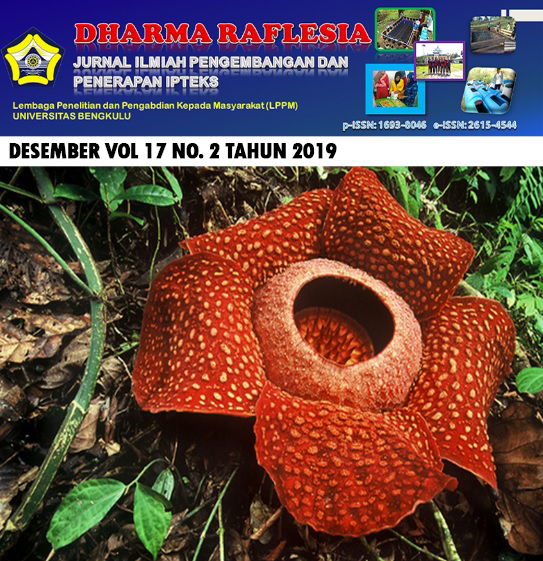Main Article Content
Abstract
The level of literacy in Indonesian is very low. Science literacy becomes very important for students to have as provisions to face the challenges of 21st-century development, including learning, innovating, critical thinking, problem-solving, creative, communication, and collaboration. Information, media, and technology literacy are becoming very important. The purpose of this activity can improve (1) teacher understanding of ICT media for literacy learning,(2) students' knowledge about animal conservation using ICT-based literacy media, and (3) student responses about ICT-based literacy media. The target audiences are (1) teacher, and (2) grade IV A and B students from State Elementary School Number 07 in Bengkulu City. The activity was carried out on the thematic learning theme 3 Caring for Living Things, Subtheme 2 Diversity of Living Things in My Environment using the ICT Based Project Based Learning model. The methods used: presentations, Focus Group Discussion, simulations and demonstrations, and classroom learning practices. The instruments used a teacher questionnaire, student responses, and essay questions. The conclusions obtained: (1) the percentage for teacher understanding of ICT literacy is still low, about 54.55%, (2) students with good categories about animal life knowledge by 93.1%, and (3) student interest on ICT learning increase about 84.62%. Suggestions given to support the successful implementation for the literacy program in elementary schools, are: (1) teachers should be able to use ICT-based learning media both on- line and off-line; (2) teachers design an assessment of students' high-level thinking knowledge.
Article Details
- Authors retain copyright and grant the journal right of first publication with the work simultaneously licensed under a Creative Commons Attribution-ShareAlike 4.0 (CC BY-SA) that allows others to share the work with an acknowledgement of the work's authorship and initial publication in this journal.
- Authors are able to enter into separate, additional contractual arrangements for the non-exclusive distribution of the journal's published version of the work (e.g., post it to an institutional repository or publish it in a book), with an acknowledgement of its initial publication in this journal.
- Authors are permitted and encouraged to post their work online (e.g., in institutional repositories or on their website) prior to and during the submission process, as it can lead to productive exchanges, as well as earlier and greater citation of published work (See The Effect of Open Access).
- This work is licensed under a Creative Commons Attribution-ShareAlike 4.0 International License.
References
- Pahlifi, Dwi Maihidin dan Fatharani Mirra. 2019, Android-Based Learning Media on Human Respiratory System Material for High School Students. Jurnal Inovasi Pendidikan IPA, 5 (1), 2019, 109-116. http://journal.uny.ac.id/index.php/jipi.
- Peraturan Menteri Pendidikan dan Kebudayaan (Permendikbud) Republik Indonesia, 2015, Permendikbud Nomor 23 Tahun 2015 Tentang Penumbuhan Budi Pekerti, Jakarta.
- Rasyid, Magfirah, Asmawati, Andi, dan Saleh Andi Rahmat, 2016, Pengembangan Media Pembelajaran Berbasis Multimedia dalam Konsep Sistem Indera pada Siswa Kelas XI SMA, Jurnal Pendidikan Biologi Volume 7, Nomor 2, Februari 2016, hlm 69-80. FMIPA Universitas Negeri Makasar.
- Rosita, Farida Yufarlina. 2015, Pengembangan Multimedia Interaktif untuk Pembelajaran Berbicara bagi Siswa Kelas IV Sekolah Dasar, JINOP (Jurnal Inovasi Pembelajaran). UMM Press 1 (1) 25-37
- Sudiran, 2015, Sikap Guru dan Tingkat Penggunaan Teknologi Informasi dan Komunikasi di Kelas sebagai Media Pembelajaran Bahasa Inggris di SMA 3 dan SMK 1 Muhamadiyah Kota Batu Malang, JINOP (Jurnal Inovasi Pembelajaran), UMM Press. 1(1) 98-112
- Trilling, Bernie and Fadel, Charles, 2009, 21st Century Skills: Learning for Life in Our Times, John Wiley & Sons, ISBN 978-0-47-055362-6.
- Way, Jenni, 2007, A Framework for Analyzing ICT Adoption in Australian Primary Schools, University of Western Sydney, Australasia Journal of Educational Technology. 23(4) 559-582
- Winarni, Endang Widi, 2018, Pendekatan Ilmiah dalam Pembelajaran Kreatif dan Inovatif, Bengkulu, FKIP UNIB Press, ISBN 978-602-8043-73-1.
- Winarni, Endang Widi, Purwandari, Endina Putri dan Hervianti, Yolanda, 2018a, Mobile Educational Game for Earthquake Disaster Preparadness in Elementary School, ARPN Journal of Engineering and Applied Sciences, Asian Research Publishing Network. 13(7) 2612-2618.
- Winarni, Endang Widi, Purwandari, Endina Putri, Lusa, Herman, dan Dadi, Sri, 2018b, The Impact of Thematic Learning Integrated ICT in Tabot Bengkulu as Cultural Ceremony toward Social Interaction Knowledge in Elemantary School, Asian Journal of Education and Training,. 4 (2), 2018, ISSN: 2519-5387.
References
Pahlifi, Dwi Maihidin dan Fatharani Mirra. 2019, Android-Based Learning Media on Human Respiratory System Material for High School Students. Jurnal Inovasi Pendidikan IPA, 5 (1), 2019, 109-116. http://journal.uny.ac.id/index.php/jipi.
Peraturan Menteri Pendidikan dan Kebudayaan (Permendikbud) Republik Indonesia, 2015, Permendikbud Nomor 23 Tahun 2015 Tentang Penumbuhan Budi Pekerti, Jakarta.
Rasyid, Magfirah, Asmawati, Andi, dan Saleh Andi Rahmat, 2016, Pengembangan Media Pembelajaran Berbasis Multimedia dalam Konsep Sistem Indera pada Siswa Kelas XI SMA, Jurnal Pendidikan Biologi Volume 7, Nomor 2, Februari 2016, hlm 69-80. FMIPA Universitas Negeri Makasar.
Rosita, Farida Yufarlina. 2015, Pengembangan Multimedia Interaktif untuk Pembelajaran Berbicara bagi Siswa Kelas IV Sekolah Dasar, JINOP (Jurnal Inovasi Pembelajaran). UMM Press 1 (1) 25-37
Sudiran, 2015, Sikap Guru dan Tingkat Penggunaan Teknologi Informasi dan Komunikasi di Kelas sebagai Media Pembelajaran Bahasa Inggris di SMA 3 dan SMK 1 Muhamadiyah Kota Batu Malang, JINOP (Jurnal Inovasi Pembelajaran), UMM Press. 1(1) 98-112
Trilling, Bernie and Fadel, Charles, 2009, 21st Century Skills: Learning for Life in Our Times, John Wiley & Sons, ISBN 978-0-47-055362-6.
Way, Jenni, 2007, A Framework for Analyzing ICT Adoption in Australian Primary Schools, University of Western Sydney, Australasia Journal of Educational Technology. 23(4) 559-582
Winarni, Endang Widi, 2018, Pendekatan Ilmiah dalam Pembelajaran Kreatif dan Inovatif, Bengkulu, FKIP UNIB Press, ISBN 978-602-8043-73-1.
Winarni, Endang Widi, Purwandari, Endina Putri dan Hervianti, Yolanda, 2018a, Mobile Educational Game for Earthquake Disaster Preparadness in Elementary School, ARPN Journal of Engineering and Applied Sciences, Asian Research Publishing Network. 13(7) 2612-2618.
Winarni, Endang Widi, Purwandari, Endina Putri, Lusa, Herman, dan Dadi, Sri, 2018b, The Impact of Thematic Learning Integrated ICT in Tabot Bengkulu as Cultural Ceremony toward Social Interaction Knowledge in Elemantary School, Asian Journal of Education and Training,. 4 (2), 2018, ISSN: 2519-5387.
